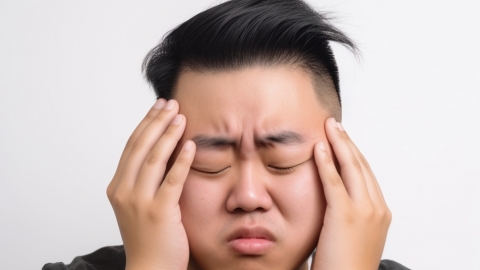What causes headaches in the left forehead area?
Generally, left forehead headaches may be caused by insufficient sleep, mental stress, temporal arteritis, migraines, cervical spondylosis, or other factors. Symptomatic treatment through general therapy, medication, and other methods is recommended. If physical discomfort occurs, prompt medical consultation and treatment are advised. Detailed analysis is as follows:

1. Insufficient Sleep
Long-term lack of sleep can easily cause cerebral hypoxia and ischemia, leading to forehead pain. It is recommended to maintain regular sleep patterns, increase sleep duration appropriately, and perform head massages to alleviate symptoms.
2. Mental Stress
Long-term mental stress may stimulate the cranial nerves, causing forehead headaches. This pain may be accompanied by palpitations, shortness of breath, and chest tightness. Daily efforts should focus on relieving tension, and participating in outdoor activities appropriately can help alleviate symptoms.
3. Temporal Arteritis
Temporal arteritis is a vascular inflammatory disease primarily caused by abnormal immunity. The inflammatory response in temporal arteritis causes thickening of the vessel walls and obstructed blood flow, resulting in headaches and facial pain. Symptoms may include fever, weight loss, and difficulty chewing. It is recommended to follow medical advice and use medications such as prednisone acetate tablets, methylprednisolone tablets, and compound cyclophosphamide tablets for treatment.
4. Migraine
Migraine is a common neurological disorder typically caused by genetic factors, disordered neural excitability, environmental changes, and other factors. It often manifests as unilateral, pulsating headaches, possibly accompanied by nausea and light sensitivity. It is recommended to follow medical guidance and use medications such as carbamazepine tablets, gabapentin capsules, and propranolol sustained-release tablets to relieve symptoms.
5. Cervical Spondylosis
Cervical spondylosis is a condition based on degenerative pathological changes in the cervical intervertebral discs, possibly related to developmental cervical spinal stenosis, chronic strain, and other factors. Cervical disc herniation or bone spurs caused by cervical spondylosis may compress cervical nerve roots, affect nerve conduction, and cause headaches, possibly accompanied by neck stiffness, shoulder and back pain, and arm numbness. It is recommended to follow medical instructions and use medications such as aceclofenac tablets, Jingfukang granules, and mecobalamin tablets to relieve symptoms.
If experiencing left forehead headaches, it is recommended to lie down in a quiet and comfortable environment, close your eyes, and relax both body and mind to help alleviate symptoms.






